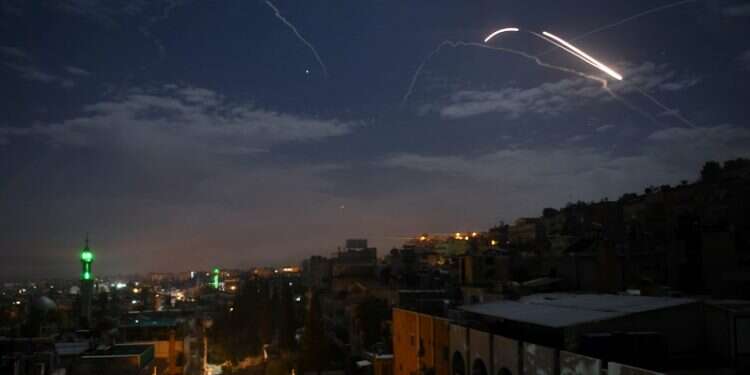The IDF on Wednesday said it struck dozens of Iranian targets in Syria, carrying out a "wide-scale" strike in response to rocket fire on the Israeli Golan Heights the day before.
The army said its fighter jets hit multiple targets belonging to Iran's Quds force, the foreign operations arm of the Islamic Revolutionary Guard Corps, including surface-to-air missiles, weapons warehouses and military bases. After the Syrian military fired a surface-to-air missile at the Israeli jets, following warnings to refrain from doing so, the IDF said a number of Syrian aerial defense batteries were also destroyed.
Follow Israel Hayom on Facebook and Twitter
Syria's state news agency SANA said two civilians were killed and some wounded in the attack.
A war monitoring group said 11 people were killed, including seven non-Syrians who are most likely Iranians.
The figures come from Rami Abdurrahman, who heads the Britain-based Syrian Observatory for Human Rights, an opposition activist group with a network of activists across Syria.
The Observatory said the Israeli airstrikes targeted arms depots belonging to the Quds Force in the Damascus suburbs of Kisweh and Qudsaya.
Abdurrahman added that several other areas were targeted in Wednesday's strikes, including the Mazzeh airbase in western Damascus where air-defense units are stationed.
Defense Minister Naftali Bennett said Wednesday morning: "The rules have changed. Whoever shoots at Israel in the day, won't sleep at night. Such was the case last week and such was the case this week as well. Our message to the leaders of Iran is simple: You are no longer immune wherever you send your tentacles – we will sever them."
A senior defense official said Wednesday morning: "Why did we attack in response to rockets that missed? That's the thing. We are changing the rules. In the south we became habituated [to the situation] because our response was always proportionate. We are changing the equation. Even if the shooting is minor we are responding. Iran shot at the State of Israel. This is delusional and we won't tolerate it. Iran is an octopus whose head is in Tehran and which spreads its tentacles to surround us. The equation where they were immune was a-symmetrical. We still haven't threatened the head of the octopus, which is Tehran, but we are starting to get close to the head of the octopus."
"The decision [to retaliate] was made Tuesday morning. It received final approval during the night. The operation was carried out while being aware that the events taking place in Iran are the gravest since the Islamic revolution from the perspective of casualties. Our message to the Iranian public: The leaders of the regime with their terroristic adventures are putting you in danger," the official said.
The strikes further burst into the open what's been a long shadow war between Israel and its archenemy Iran. The two foes have increasingly clashed over what Israel says is Iran's deeper presence along its borders.
"Yesterday's Iranian attack towards Israel is further clear proof of the purpose of the Iranian entrenchment in Syria, which threatens Israeli security, regional stability and the Syrian regime," the IDF said in a statement, adding that it would "continue operating firmly and resolutely" against Iran in Syria.
"We acted against the Syrian host and Iranian guest," the IDF statement continued. "We are prepared to defend and to attack and will respond harshly to any retaliation attempt. We are ready for any scenario. We will not tolerate Iranian entrenchment. It is a red line."
In a possible indication of prior coordination with Russian forces stationed in Syria, the army also said, "We did not attack the batteries from where the rockets were fired at Israel on Tuesday. We didn't attack [Russian-made] S-300 air-defense batteries. In the morning [Wednesday] we will gain a better understanding of their casualties. We coordinated with the superpowers in the area."
However, Russian Deputy Foreign Minister Mikhail Bogdanov said on Wednesday that the Israeli airstrikes were a wrong move, and Moscow had contacted its allies about the incident, Interfax reported.
The IDF statement concluded: "We are ready for three scenarios: No response, a minor response and a more significant response. At the moment there are no special directives from the Home Front Command [to civilians]. Every target we struck was within a range of 80 kilometers (50 miles). Forces in stationed in the north have not received reinforcements."
Israel's Iron Dome air-defense system intercepted the four rockets on the Golan Heights on Tuesday which came amid heightened tensions between Israel and Iranian proxies along its borders. Prime Minister Benjamin Netanyahu has issued a series of warnings recently about Iranian aggression throughout the Middle East.
Israel last week fought against the Iranian-backed Palestinian Islamic Jihad terrorist group in Gaza, striking and killing a top commander in the coastal enclave and is widely believed to have struck and missed another leader of the group in Syria.
Iran has forces based in Syria, Israel's northern neighbor, and supports Hezbollah terrorists in Lebanon. In Gaza, it supplies PIJ with cash, weapons and expertise.
Netanyahu also has claimed Iran is using Iraq, where it operates powerful Shiite militias, and far-off Yemen, where Tehran supports Shiite Houthi rebels at war with a Saudi-led coalition backing the government, to plan attacks against Israel. Hamas also receives some support from Iran.




